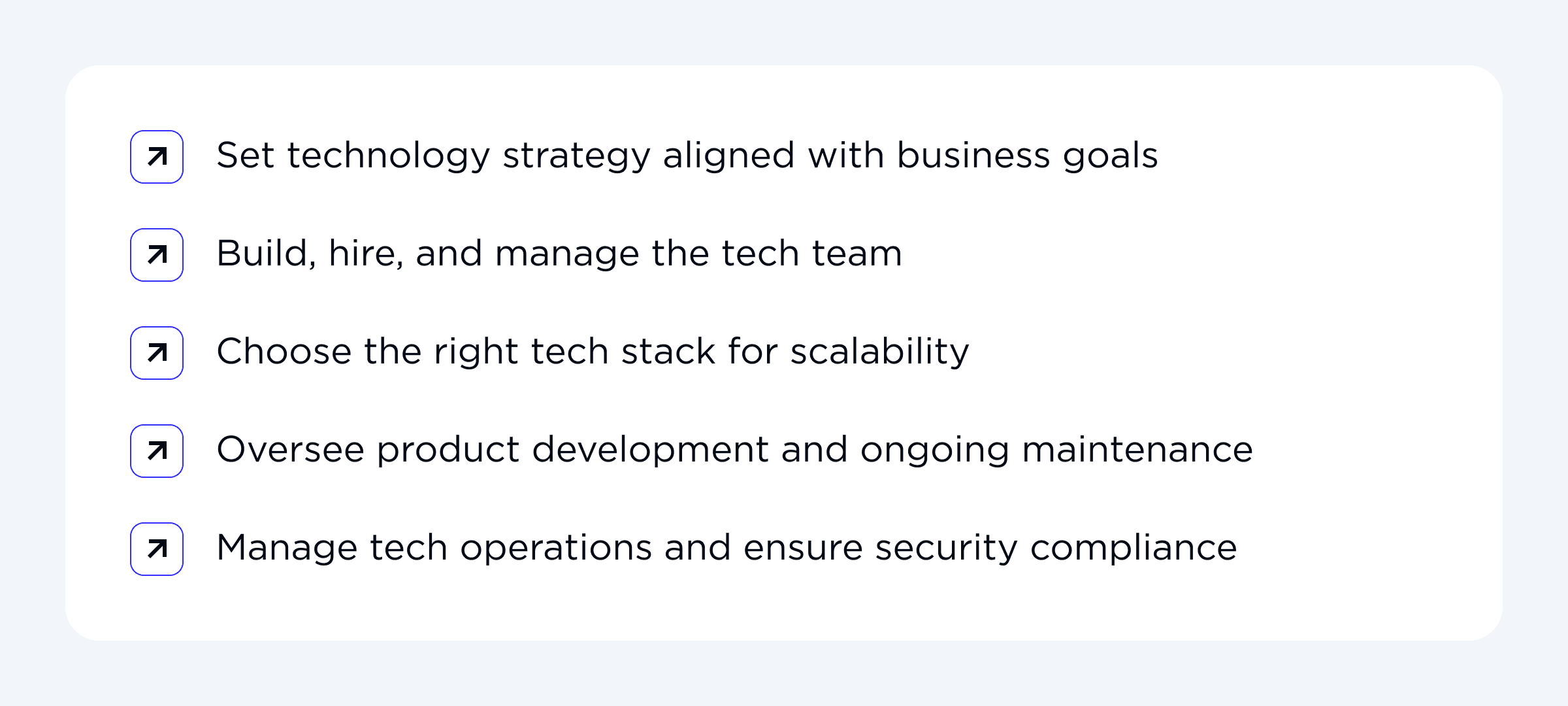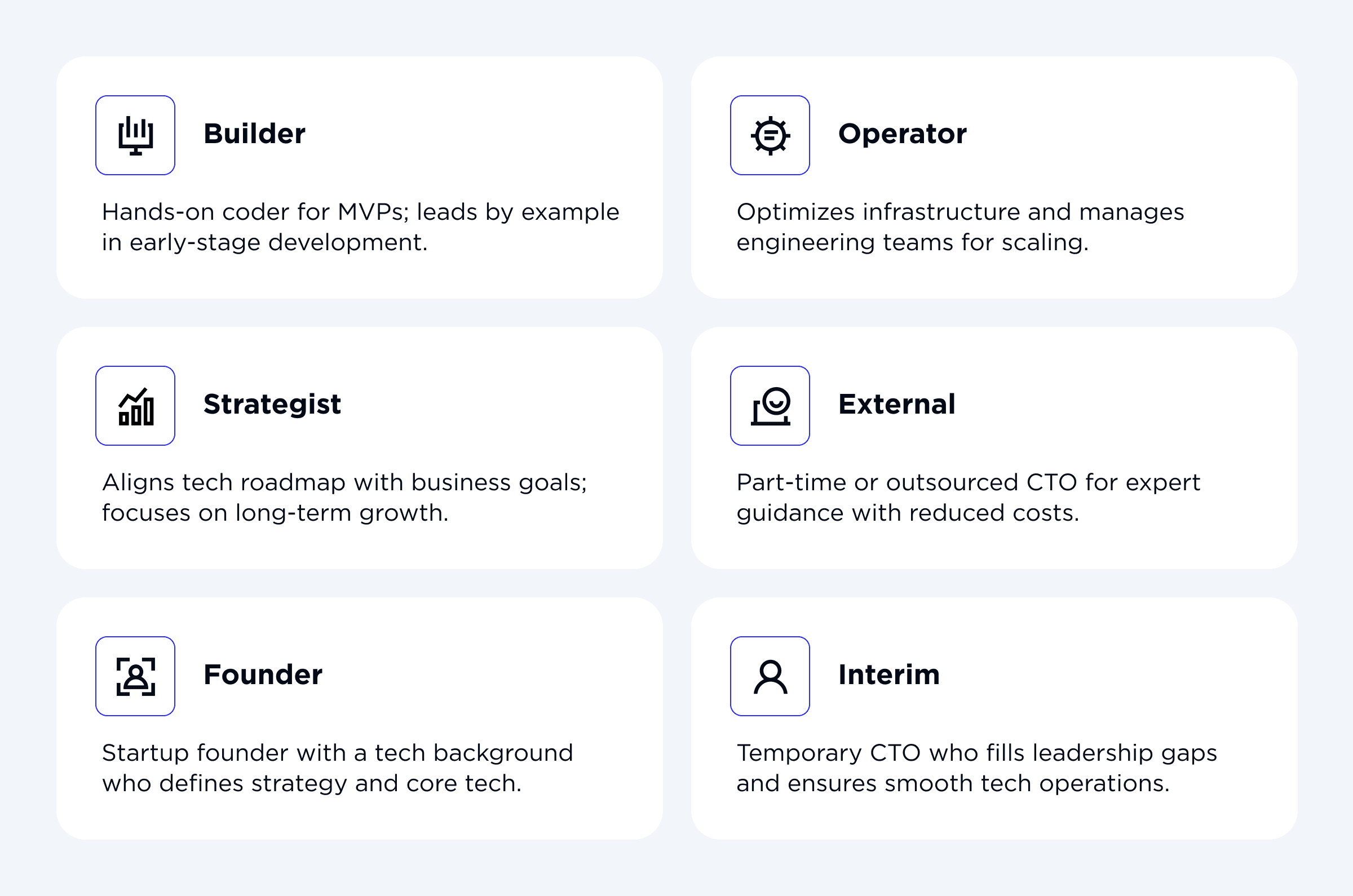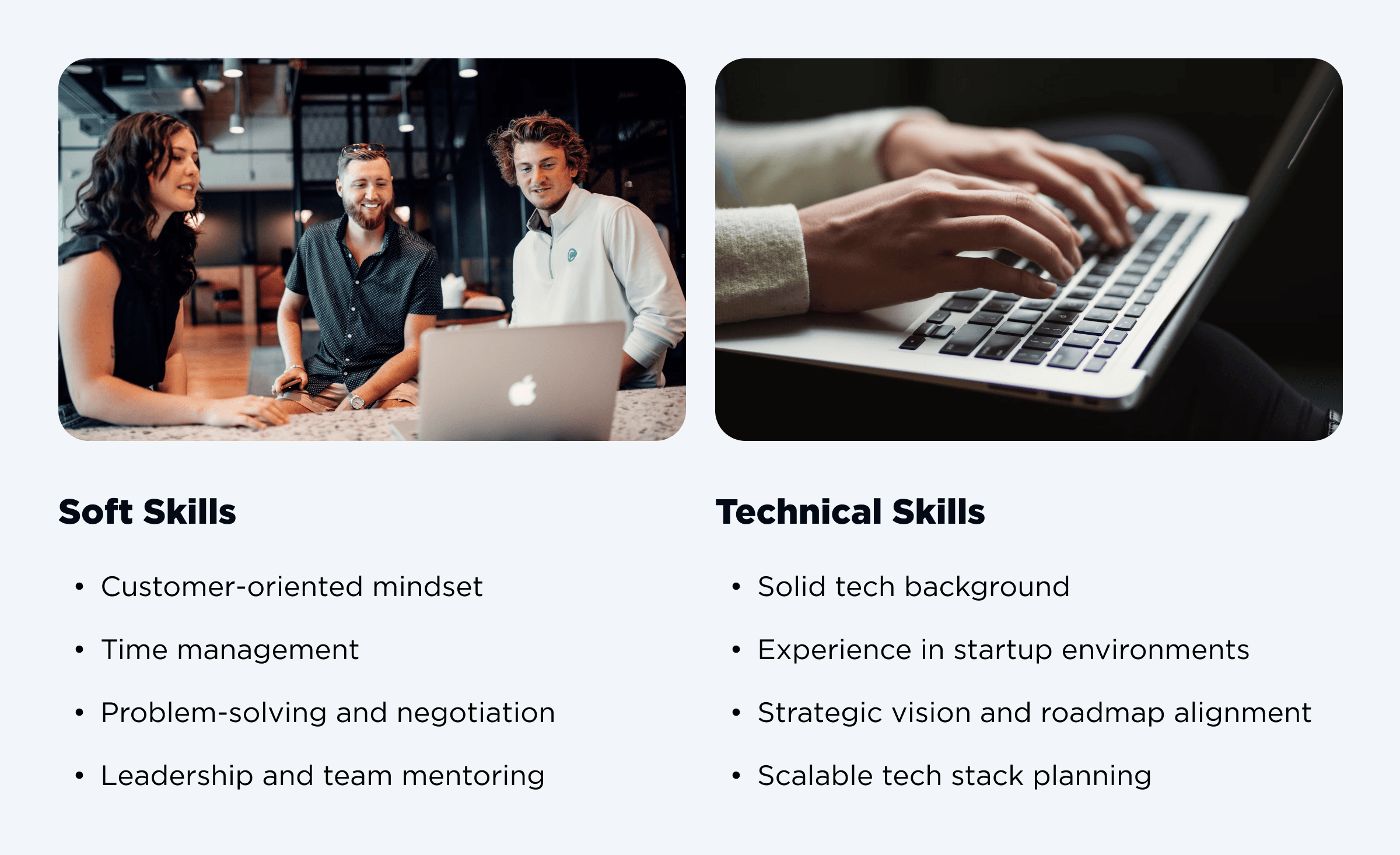Imagine you’ve got a brilliant business idea. You’ve already found your dream team and raised some funds for the launch. Sounds great, right? Does it mean you are ready to go all in and market your products? That’s doubtful. The current situation in the market is competitive and requires way more effort. That’s why the next major question is, who’s going to lead your technology direction? Who will be responsible for the strategy development? A lot of startup owners choose to take it on themselves. However, is it successful? Only you can answer this question. But we have some good news for you! The real game changer is when you involve the CTO as a service or hire a full-time CTO (Chief Technology Officer). They play a crucial role in shaping your product, hiring and managing your tech team, and making sure your startup scales and evolves smoothly.
Having such options, many people face the dilemma of whether to hire or outsource a startup CTO or become one. The answer is not as straightforward as it sounds. What skills are required to be a good CTO? Being hands-on with coding or more focused on strategy? What knowledge really matters? And how do you even find the right person for the job? There are many other questions that need answers. So, we hope we’ll cover everything in this article to simplify the process of making more informed decisions.
What Role Does a CTO Play in a Startup?
We’ve already mentioned that the role of the CTO in startups is crucial. They make it much easier and more productive to choose the proper technical direction of a startup, make sure they will scale up smoothly, and carry out the proper measures to lead your company and tech team to success.
It might be easier to define the role of a CTO in large enterprises. However, when it comes to startups, CTOs usually wear multiple hats. Some of them are involved in business aspects, some are even still coding when needed (to help and lead the tech team properly), some are in charge of the hiring process, and others are responsible for strategic planning. Usually, their roles are pre-defined at the beginning of cooperation. When you outsource these specialists, you can even get a consultation from a dedicated software company on what key responsibilities a CTO should fill in precisely for your startup.
Let’s summarize the key roles of a CTO in a startup:

- Set the technology strategy and align it with your business
- Build, hire, and lead the tech team (covering the whole process from hiring to managing workflows and establishing a strong team culture)
- Choose the right tech stack, ensuring further scalability and efficiency
- Oversee product development process and maintenance to meet business goals and market needs
- Manage tech operations and comply with security standards
- Represent the tech side of the company and help involve investors
Depending on what a startup CTO is responsible for in your company, we can define their different types. Let’s discover more!
What are the main CTO types in a startup?
There’s no denying that all startups are different. The same goes for CTOs – they are not the same, and their role and type depend on the company’s stage of development, needs, and market demands. So, let’s find out the most common types of CTOs you can encounter in the startup world.

The Builder (or technical CTO)
This type of CTO in startups is about being hands-on with code and architecture. They are commonly chosen at early-stage startups. They are especially suitable when you are building a minimum viable product (MVP). As they are builders, they always lead by example and take part in coding and system design.
The Operator (or operational CTO)
If you can imagine the role of an operator in manufacturing, for example, you might have already guessed that such CTOs are in charge of refining processes, managing engineering teams, and optimizing a startup’s infrastructure. Operational CTOs are recommended when you need to scale startup environments, establish and improve structure and team efficiency, and need someone to grow your business in general.
The Strategist (or visionary CTO)
From the name itself, this type is about developing and aligning your technology roadmap with your business goals. Such CTOs work closely with top managers and help you to focus on the big picture. They check on market trends and customer needs to make sure your company will grow strategically and constantly.
The External CTO (fractional or outsourced CTO)
Hiring part-time or outsourcing a CTO for startups is one of the most popular types of involvement. This way, your company gets access to top-notch expertise while optimizing technology resources without the full-time commitment. That’s the reason why it is ideal for startups. At the early stage, it is essential to have professional guidance, yet money can be an issue. Great option indeed!
The Startup CTO (or founder type)
If a startup owner knows they are ready and have enough time also to take on the responsibilities of a CTO, this is a choice. Sometimes founders or co-founders tend to turn into CTOs if they have a proper technical background. They define the core tech and business strategy from the ground up. It can be complicated, though, as they have to take an active part in both strategic thinking and daily decisions.
The Interim CTO
When a startup is in a hurry and doesn’t have enough time to look for a CTO, they opt for this type. The interim CTO for startups is basically responsible for the quick, efficient, and smooth implementation of technology solutions. In most cases, they temporarily fill the leadership gap. It may happen after a founding CTO leaves or while recruiting and hiring a permanent one. The interim CTO is an excellent option for short-term goals, yet it's still effective in terms of experience and performance.
Depending on your business goals, technical requirements, and resources, you may choose and shift between different types of CTOs. You may even follow the sequence first involving a Builder, then a Strategist, and later on – an Operator. Also, you may opt for an outsourced professional or a fractional one and involve them for specific purposes. Whatever you choose, make sure it aligns with your business needs.

Contact our team to hire an experienced CTO
CONTACT USWhat Are the Main Responsibilities a Startup CTO Carries Out?
While figuring out the major types of CTO, we’ve already discovered some of the responsibilities a startup CTO has. Below, we’re going to break it down to make it clearer for you to understand their role when making a decision.
Managing the tech team
AT their core, a CTO is a leader first and a tech expert second. They are in charge of streamlined hiring, mentoring, and managing. They create a team of developers that together create something of value driving innovation. Their responsibilities also include resolving conflicts, motivating the team, and establishing or adjusting the corporate culture. As you can see, their impact reaches far beyond code. It’s the CTO’s job to ensure high-performance morale.
Defining and aligning the technology stack
There’s no denying that choosing the right technology stack is critical for a startup’s future. Thus, the startup CTO must select all the required tech stacks, e.g., programming languages, frameworks, and infrastructure. When they align everything properly, your company is not at risk of piling up technical debt, so you can have peace of mind there are no significant roadblocks down the line.
Supervising and managing key operations
Obviously, all CTOs are responsible for keeping the digital engine running. They handle cloud deployments and cybersecurity. Regarding tech-related operations, they oversee that everything runs smoothly like clockwork. It is not a secret that startups often run on tight budgets. That is why CTOs are there to make sure every penny brings some value. They optimize operations and just do more with less.
Monitoring performance
System performance is essential. That is why a CTO for startups must optimize speed and efficiency and support the infrastructure for it to work without hiccups or bottlenecks. They should always stay ahead of performance issues before they even appear. They can do so by establishing KPIs for software development teams, tracking uptime (or overtime), fine-tuning systems for peak efficiency, and improving user experience by never letting them feel any strain behind the scenes.
Following a visionary approach
It is obligatory for a CTO to have a long-term vision and bridge the gap between technology and business. They take care of day-to-day tasks, of course. However, there are things like staying up-to-date with technological developments, analyzing the market and competitors, and making the company future-proof. They should always stay in tune with the latest trends.
Representing the startup
In a nutshell, the CTO is the face of the brand when needed. Be it pitching to investors, speaking at conferences, or engaging with customers, they are those who can seamlessly translate complex technical aspects into clear business value. Representing a startup, they should be able to win trust with their technical credibility and make everyone excited about the product’s potential. As a result, they help secure funding and guarantee the best possible future for business.
What Skills Are Required of a Startup CTO to Bring Value?
Considering all the responsibilities a CTO carries out, there is a particular skill set they should possess. Be aware it is a mix of soft and technical skills. Let’s explore more.

A customer-oriented approach and mindset
Startup CTOs should understand customer needs and build products with empathy, not just efficiency. When they are able to turn feedback into features, it means they can solve real problems. Helping tech companies to stay competitive equals the need to keep the user journey in mind at every step of the way.
Time management skills
As you can see, a CTO in startups has so many responsibilities that it’s essential not to lose their focus and sight of long-term goals. They should efficiently manage their time and effort and balance it through quick fixes and long-term impact. They are usually extremely busy, so their skills should make it possible to make the most of those limited resources and time.
Profound expertise and experience in startups
It is important to remember – startups operate differently from large enterprises. Sometimes a startup CTO should know how to navigate the chaos. When they have prior experience, they can easily adapt to rapid changes and tight budgets.
Problem-solving and negotiation skills
Startup CTOs must be quick on their feet as challenges are inevitable. A great professional is a fast thinker, able to solve any issues, and can easily make decisions under pressure. Moreover, they are masters of trade-offs and know exactly how to seal the deal. Great CTOs have strong analytical and problem-solving skills to negotiate with investors, vendors, and internal teams.
Solid technical background
An experienced CTO is a tech-savvy decision-maker who has a profound knowledge of even the most intricate details, from software architecture to cloud computing. They should have experience in various tech stacks like front and back end, DevOps, AI, blockchain, cybersecurity, etc. They always build on real-world experience.
Strategic leadership and tech vision
Ensuring the company’s growth is a must! A CTO must align the technology roadmap with the business strategic direction. All the solutions that come up on the way should scale with purpose and balance short-term releases and long-term sustainability.
Potential Pitfalls a Startup CTO Might Encounter
Despite the exciting role startup CTOs play, they do face challenges and hiccups. There’s nothing that can’t be overcome. However, we should get you acquainted with these matters as well.
Building and growing a team
No matter the industry, finding and retaining skilled professionals is tough. When it comes to tech startups, it may be even harder. A CTO has the difficult task of attracting talent through innovation, retaining them through purposeful leadership, and always helping level up juniors through mentorship.
Balancing innovation with stability
Striking the right balance between innovation and practicality is a constant challenge. CTOs must always drive future growth with sustainable innovation. However, it should be within practical limits. Choosing the appropriate solutions over flashy tech is sometimes the right decision to make, and they have to see it through.
Mastering effective prioritization
With so many responsibilities, a CTO must focus on what matters most. Sometimes, they should be able to make decisions on the fly, but they have to avoid distractions that hinder growth. It is the art of aligning priorities with long-term business objectives and deciding where to allocate the resources.
Steps to Take When Hiring a CTO for a Startup
You’ve already discovered the main types, responsibilities, and needed skill sets of CTOs. But how do you choose which to hire? Well, even though it may appear evident to you, there are some crucial steps to take for a startup’s success.
Step 1. Estimate your startup needs
Even before you start looking for one, you should understand your needs and decide what type of CTO you’re looking for, whether a strategist, operator, or builder. Remember, there’s no one-size-fits-all.
Step 2. Select between in-house or outsourcing
As mentioned earlier, depending on your startup's requirements, you may benefit from an in-house or outsourced CTO. You should keep in mind – when opting for an outsourced CTO you do save costs but still get expert guidance.
Step 3. Partner with a dedicated software provider
It is the best way to find your perfect match. When you partner with a reputable and experienced IT service provider, you can be sure they’ll help you find the best CTO with proven technical expertise.
Step 4. Evaluate candidates' industry and tech-related expertise
You will for sure understand when a candidate is your match. Nevertheless, you should pay attention to the fact of how well they understand your industry, what experience they've already got, and what technologies they’ve worked with. Check whether they have relevant skills to turn your business challenges into real innovative solutions.
Hiring an External CTO: Advantages You Get
In a nutshell, what are the benefits of hiring an external CTO? Let’s find them out in this quick summary.
- Cost reduction (hiring a full-time executive is way more expensive)
- Access to the talent pool and expertise (you get a much broader perspective)
- Easier and faster to hire (outsourcing a CTO saves your time and resources)
- Flexibility with scalability (you can always adjust CTO commitments)
Hiring a Startup CTO: OTAKOYI as Your Trusted Partner
If you are in need of experienced consultants to help you select the right CTO, OTAKOYI has you covered! We not only provide tailored software solutions but also help startups with scalable growth.
What do you get when outsourcing a CTO from OTAKOYI?
Profound understanding of startup needs
We know what it takes to thrive in the competitive startup world. We do our best to find a CTO that perfectly fits your business requirements and goals.
Customized CTO search and collaboration
We craft personalized strategies to find and collaborate with the most suitable CTO for your startup ecosystem, whether an in-house executive or an external specialist.
Strategic guidance for continuous growth
Our goal is not just to fill the role – we choose a professional to align with your technical vision, and scalability plans and navigate through complexities.
Seamless recruitment process
We follow the approach that no hiring should be a headache. Our team optimizes the process and saves your time and nerves.
Ongoing support and scalable solutions
When you partner with OTAKOYI, you can expect ongoing support, scalable tech solutions, and always being there for you.
Proven track record of success
Considering our history of successful startup collaborations and satisfied customers, you can be sure that OTAKOYI is your trusted partner for the right tech decisions.
Wrapping Up
The key to unlocking the real potential of your startup is choosing the right CTO. They are partners for a long period, turning your innovative ideas into reality and putting you on the path to success. Whether you pick an in-house or outsourced CTO, keep in mind – the right fit is essential. And with OTAKOYI by your side, you’ll launch your startup with flying colors and stay ahead of the competition. Are you ready to thrive with the right leadership and tech strategy?





